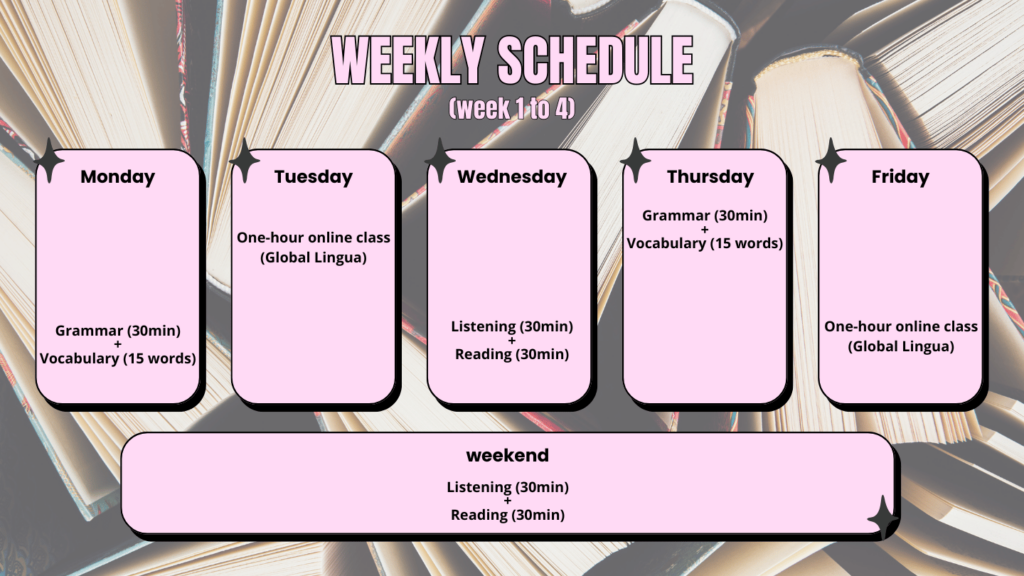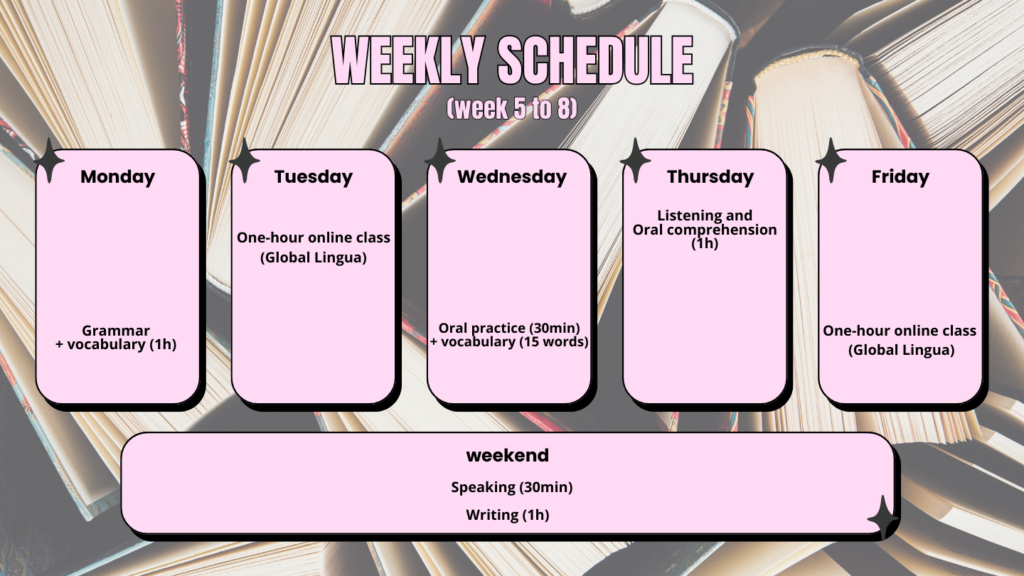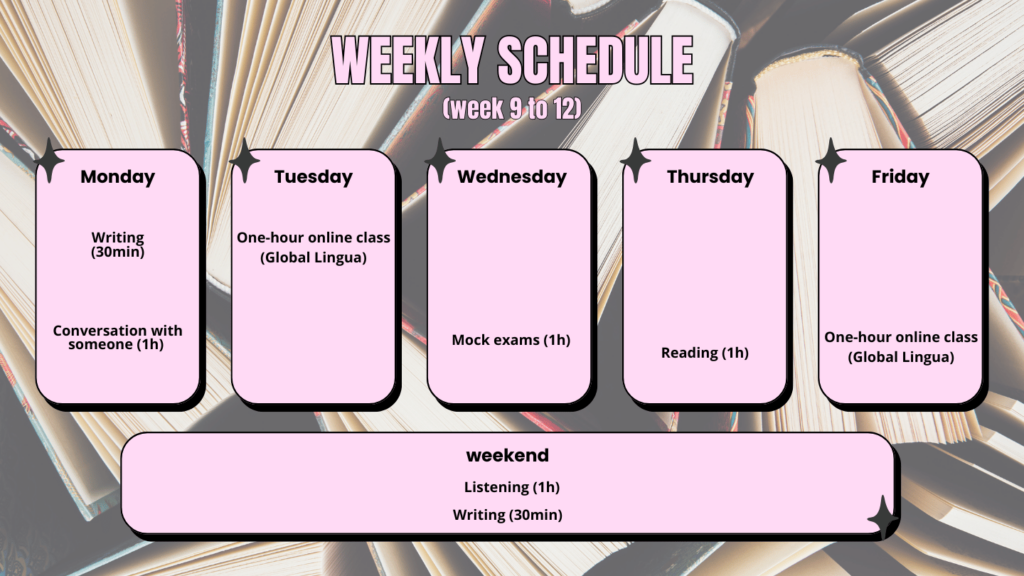Learning French can be a long and difficult journey, especially if you can’t seem to improve. Don’t panic: the most important thing is to stay consistent in your studies. To help you go from A2 to B1 in French, we’ve put together a 12-week revision plan combining online courses and self-study time.
How hard is it to go from A2 to B1 in three months? We’re not gonna lie, it’s not easy and it takes some hard work. But if you give it enough time and stay on track, it’s possible! For the best chance of success, we recommend taking online courses with a qualified teacher: this allows you to consolidate what you’ve learnt, while working on your weak points.
Here’s a 12-week revision schedule, combining two hours of lessons a week with self-study lessons in between. You can organize your planning as you wish or take inspiration from our planning pictures.
Weekly Schedule to Go From A2 to B1 in French
Weeks 1 to 4: Review the basics
Let’s begin with some ground work. There’s no point in trying to gain a CEFR level if your foundations are weak. You don’t want to learn new things, even though you can’t engage in conversation or use the wrong verb tense when writing your emails… So, for this first month of intensive learning, concentrate on the grammatical basics.
Online classes: (2h per week)
If possible, take 2 one-hour courses during your week for quick progress. But know that if your schedule is too hectic, Global Lingua also offers 30-minute courses. During these first lessons, we advise you to concentrate on the essential grammatical basics (present, past, future, comparatives, superlatives) and to practice simple dialogues from everyday life.
Self-study (3-4h per week):
- Grammar (30 min x 2): Do grammar exercises (you can find some online) or use grammar books.
- Vocabulary (30 min x 2): Learn 15-20 words/expressions per week related to your daily life. If some words are more difficult to learn, consider writing them down on post-its and sticking them in your bedroom, bathroom or kitchen!
- Listening (30 min x 2): Watch videos adapted to your level (videos on Youtube or short TV shows episodes with subtitles).
- Reading (30 min x 2): Read simple texts (short stories, online news articles).

Weeks 5 to 8: Consolidation and active practice
Online classes: (2 hours per week)
Ever tried role-playing? Online classes are perfect for everyday conversations: ask your teacher to focus your conversations on practical situations, such as buying a subway ticket, asking for directions or talking about your work. Thanks to these talks, you’ll feel more at ease and less need to search for words in French.
It’s also time to deepen your knowledge of verbal tenses, such as the present perfect and the conditional).
Self-study (4-5 hours per week):
No pain, no gain: let’s increase our work hours! After all, if you want quick and effective progress, you have to put in the time. Since one day is only 24 hours long, try to combine everyday tasks with study sessions… For example, listen to French podcasts during your commute or while preparing meals.
- Oral practice (30 min x 2): Record yourself answering open-ended questions or talking about your day. It’s the perfect compromise if you wish to practice speaking French without having to deal with an interlocutor.
- Writing (30 min x 2): Write short texts, such as e-mails or postcards. You could also start to write in a special diary to document your language learning journey!
- Listening and comprehension (1h or 2h): Listen to a simple podcast or songs in French (focusing on the lyrics), then write down any vocabulary or expressions you didn’t know.
- Grammar and vocabulary (1h): use interactive games or language-learning apps like Duolingo and Babbel.

Weeks 9 to 12: Objective B1
Online classes: (2 hours per week)
Take advantage of online lessons to discuss various topics with the teacher: upcoming trips, problems encountered at work, a few simple current affairs… The teacher can also suggest some homeworks, like mock exams or oral and written comprehension exercises.
Self-study (5-6 hours per week):
This is the home stretch, so don’t skimp on self-study! And remember to vary your learning resources. To fully gain a CEFR level, it’s essential to work on oral and written comprehension, as well as oral and written expression.
- Exam simulation (1h): This is the time to check whether you’re ready to move up from A2 to B1, or whether you need to double your efforts during the last 4 weeks of this challenge. Test yourself with French B1-level exercises, for example on the Test Lingua training platform.
- Conversation with a language partner (1h): You can take an extra hour of lessons a week with your teacher, or use platforms like Italki or Tandem.
- Active reading (1h): News articles, short stories or excerpts from easy books… Anything is good for working on reading comprehension. Write down the vocabulary you’ve learned in a notebook or create some flashcards.
- Active listening (1h): This is the week’s relaxation time! Watch films or TV series (with or without subtitles, depending on difficulty), noting important phrases and new expressions.
- Advanced writing (30 min x 2): This time, the aim is to go further than a simple e-mail. Try to describe more complex situations or give your opinion on a subject.

How to Go From A2 to B1 in 3 Months: 6 Tips for Effective Learning
Regularity: No need to study for 4 hours every weekend, only to forget about it during the week. Try to study a little bit every day, even if it’s only for 15-20 minutes. Eventually, it will become a (healthy) habit!
Mix skills: Alternate grammar, vocabulary, listening and production (written/oral), at the risk of relying on your strengths without ever working on your weaknesses.
Immersion: When trying to reach the B1 in French, details make all the difference! Change the language of your telephone to French, cook following recipes in French, or listen to French radio. And if you can afford it, book a vacation in France!
Feedback: It’s hard to learn a language on your own, especially when you’re just starting to get the hang of it. To make sure you’re on the right track and not learning the wrong things, have your writing or recordings corrected by a teacher.
Small goals and rewards: Set weekly goals (e.g., learn 20 new words or read an entire short story) and reward yourself with a treat or an evening with friends (to whom you will be able to show off in French).
Motivation: With such an intense study schedule, it’s important to keep motivated! To keep you on track, remember to link learning French to your interests (be they films, travel, books…).
Do you want to go from A2 to B1 in French? It’s going to take a lot of work, but if you adapt this plan to your schedule, you’ll quickly see progress. You’re well on the way to achieving your goal!











